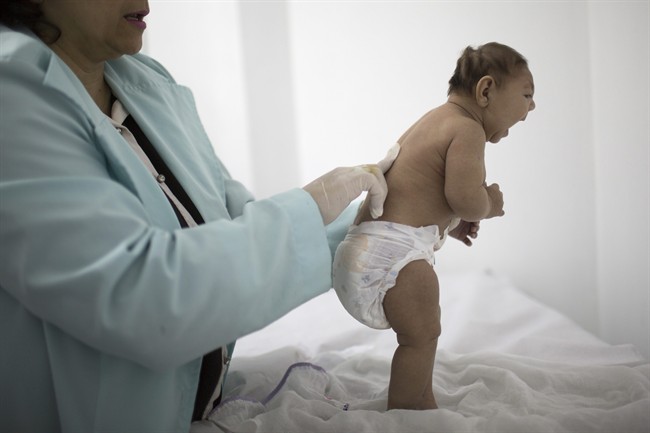About 10 per cent of fetuses or babies born to women infected with Zika in the U.S. have visible birth defects, the Centers for Disease Control and Prevention (CDC) says.

According to a report that was released Tuesday, 250 pregnant women had confirmed Zika infections in 2016, although nearly 1,000 pregnant women in total from 44 states had some evidence of a recent Zika infection.
READ MORE: Zika virus update: Canadian cases amp; what to do to prevent it
“Testing for Zika remains complex because there is a narrow timeframe for obtaining a positive laboratory result, and many infected people do not have symptoms that might motivate testing,” the report reads. “For this reason, CDC is monitoring all pregnant women with any evidence of recent Zika infection.”
The report states that most of the U.S. women who contracted the disease did so in an area where Zika was known to be present.
“We are still seeing about 30 to 40 new Zika cases in pregnant women each week in the United States,” CDC acting director Anne Schuchat told NBC News. “We do know this devastating outbreak is far from over and the consequences of this outbreak are heartbreaking.”
Of the 250 lab-confirmed confirmed cases last year, 24 women had babies with birth defects.
Other findings from the Vital Signs report include:
- Nearly 1,300 pregnant women with evidence of possible Zika infection were reported to the U.S. Zika Pregnancy Registry.
- Confirmed infections in the first trimester posed the highest risk. About 15 per cent have Zika-related birth defects.
- About one in three babies with possible congenital Zika infection had no report of Zika testing at birth.
- About one in four babies with possible congenital Zika infection were reported to have received brain imaging after birth.
“With warm weather and a new mosquito season approaching, prevention is crucial to protect the health of mothers and babies. Health-care providers can play a key role in preventive efforts,” Schuchat said in a statement.
Zika infections during pregnancy can cause serious damage to the brain and microcephaly in developing fetuses. It can also result in a list of birth defects that include brain abnormalities, vision problems, hearing loss and problems moving limbs.
It’s recommended that pregnant women avoid travelling to areas with risk of Zika and not have unprotected sex with partners who have travelled to areas with Zika.
According to a study released earlier this year by the Canadian Travel Medicine Network, the Zika virus hit Canadian travellers more than expected, beating out other infectious diseases like dengue and chikungunya.
READ MORE: The biggest medical breakthroughs of 2016
Researchers looked at the records of 1,118 travellers who visited travel clinics in several provinces for illnesses they contracted in Central and South America and the Caribbean between October 2015 and September 2016.
The study found that 41 people (almost four per cent) had Zika, while another 41 had dengue and 23 had chikungunya.
About 60 per cent of travellers who were infected were women – 79 per cent of who were of child-bearing age.
In total, the Public Health Agency reports 473 travel-related and three sexually transmitted cases of Zika virus in Canadians as of Feb. 9.
— With files from Carmen Chai






Comments